Ceremonies support attendees to offer things to keep and things to let go of
Fraser Salish Elders, Youth, Chiefs, Health and Technical staff gathered for the Fraser Salish Caucus on Sema:th territory in Abbotsford March 27-29 for discussions on health service improvements, mental health and wellness, Nation rebuilding and health governance.
18 political leads, 17 health leads, and seven technical leads were on hand for three days of moving forward on health systems transformation for Fraser Salish communities. Day one opened with a cultural procession and welcome to the territory from Jackie Bird from Sema:th First Nation.
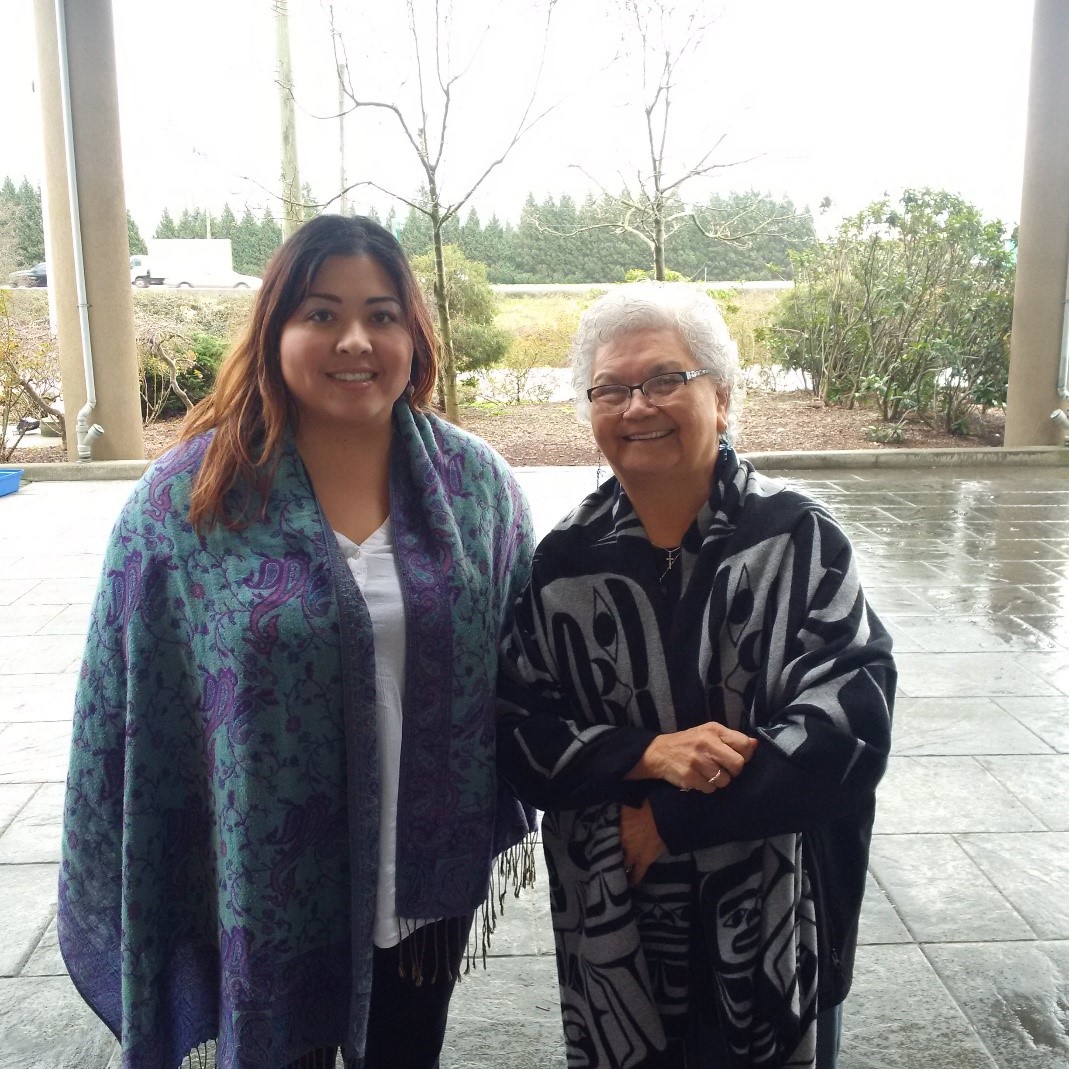
Above: Fraser Salish Living Marker Wenona James-Point (left) and Corner Post Virginia Peters at the Fraser Salish spring regional caucus.
The first order of business was hearing reflections from the Fraser Salish Corner Post Virginia Peters and Living Marker Wenona James-Point, on the last four years of the First Nations Health Authority (FNHA) since transfer. A Living Marker and Corner Post were chosen to represent each of the five regions of the province at the Ceremony to Mark Transfer of health services from Health Canada to the FNHA in 2013.
"The cedar is vulnerable when its young and the rings tell its stories," she said. "Right now I see the FNHA as establishing roots in the ground to become strong."
"When we're dealing with challenges it's important to have a solid structure to raise these issues. We need our Corner Posts to set that strong foundation," said Virginia Peters of Sts'ailes.
Living Marker Wenona James-Point works with the FNHA and referred to the creation of the organization and transition of services as a cedar tree. "The cedar is vulnerable when its young and the rings tell its stories," she said. "Right now I see the FNHA as establishing roots in the ground to become strong."
A Fraser Salish and Fraser Health partnership update was shared, with a brief discussion on the Fraser Health complaints process and efforts underway to promote cultural safety and humility within the health system in the region. Over 2,750 Fraser Health staff have taken the Provincial Health Services Authority Indigenous Cultural Competency training to date. With nearly 25,000 staff, 2,600 physicians and 8,000 volunteers at Fraser Health, there is a need to share this work and understanding of the importance of cultural safety and how it can lead to more effective health services for First Nations and Indigenous peoples.
An FNHA services update was next on the agenda, led by new Acting Executive Director Michelle DeGroot and other staff discussing regional updates, mental health and wellness services, the Indigenous cancer strategy and health benefits transformation including the pharmacare transition. Through text voting on site, the three regional priorities identified on site were: addictions workers, home care resources, and nursing increases.
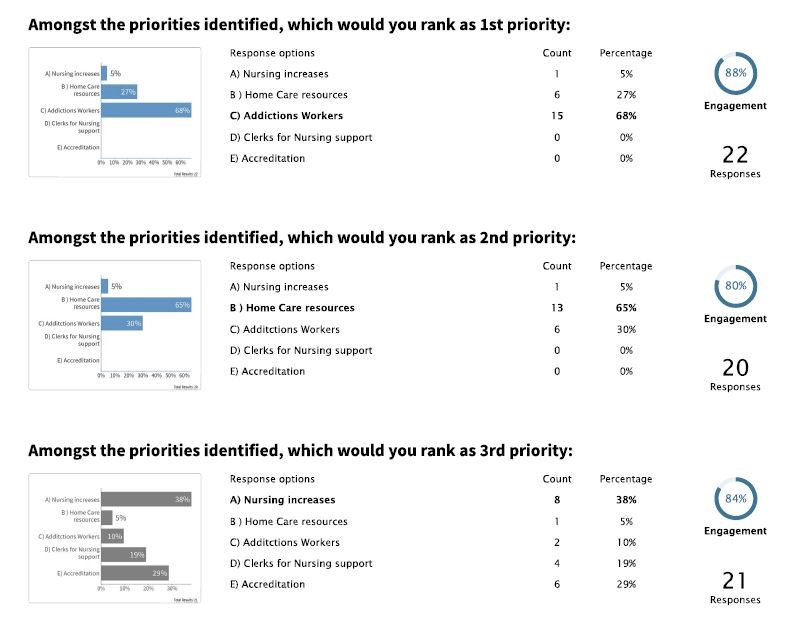
Above: Fraser Salish regional priorities outlined through text voting on site.
After a leadership dialogue, the caucus moved into an update on the opioid response in the region, a community health and wellness best practice of Telmexw Awtexw Day treatment program and presenters from the Foundry, Abbotsford location.
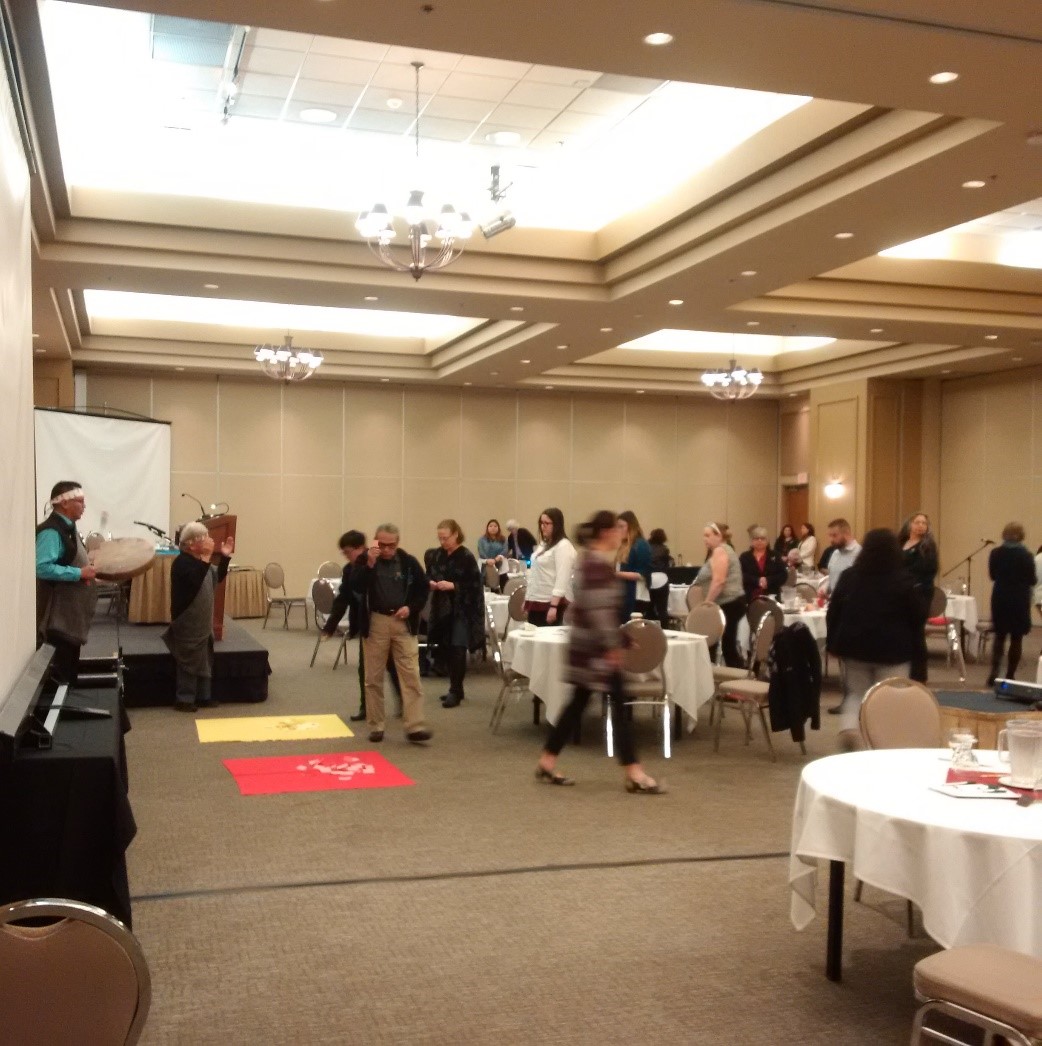
Above: Day one closed with a ceremony of reflecting on things to keep and things to let go of.
Day one closed with a ceremony of reflecting on things to keep and things to let go of. Attendees were invited to write down and give away negative things they have been holding on to, and to offer some things to keep. These things would then be burned in ceremony and prayer.
Day two opened with a regional panel on mental health and wellness. FNHA Regional mental wellness advisors Jodie Millward and Laurie Edmundson shared a presentation on the Fraser Salish mental wellness team implementation plan. The Fraser Salish region is the only one in the province to have two regional mental wellness advisors. They described the three mental wellness forums in the region to date, collaboration and partnership working group, and one on one Nation meetings to inform the plan.
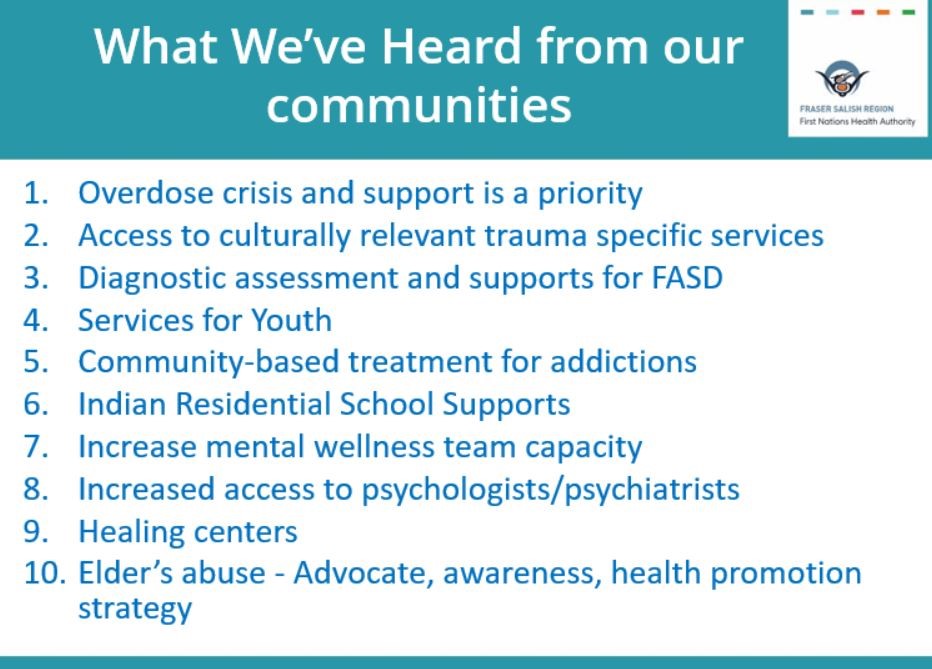
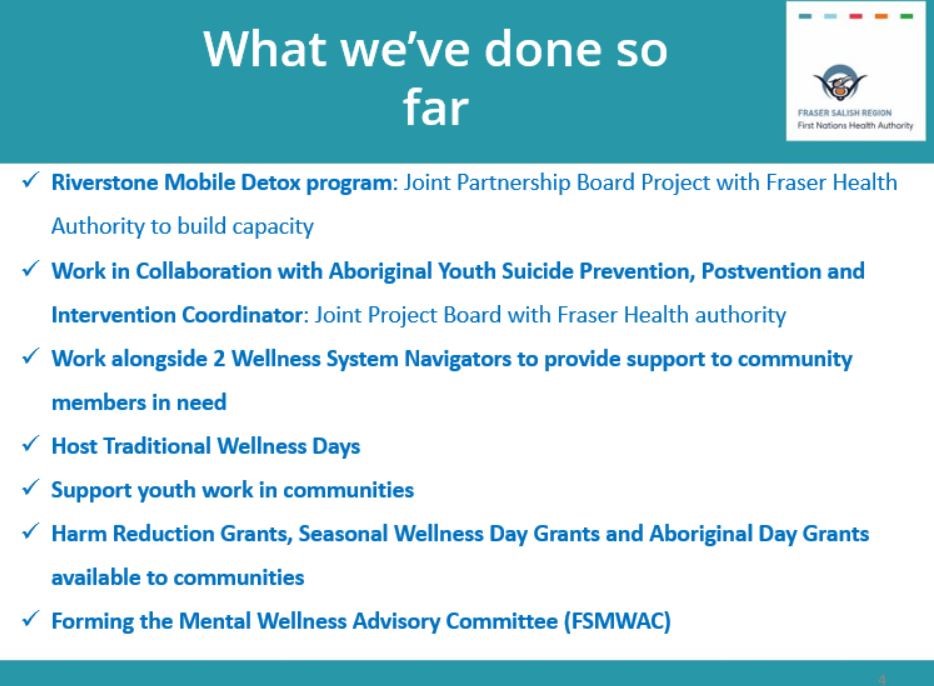
Above: Fraser Salish Mental Wellness Implementation plan: What We've Heard, and What We've Done.
The Fraser Salish Mental Wellness team is recruiting additional skilled team members to meet identified needs, including an addictions specialist, traditional wellness coordination and crisis coordinator. Three mental wellness priorities in the region include addressing the overdose crisis, Fraser Salish call to action on suicide and addressing sexual abuse in community. Some of the work in these areas discussed included, mobile detox in the FS region, increasing harm reduction options in the region, supporting youth work in the region, increasing access to traditional healers and the creation of a traditional wellness advisory committee, commitment stick grants, land-based services and activities, supporting traditional wellness days.
During the leadership dialogue on mental health and wellness, a number of Chiefs and health leads expressed their interest in hosting an Indigenous safe consumption site in their territory, with the possibility of offer concurrent mental wellness and residential treatment on site.
Chief Ken Hansen of Yale First Nations also spoke of the importance of addressing sexual abuse in sacred places. . "How many of us are aware of abuses that take place in churches? How many of us are aware of abuses that take place in our own sacred places?"
The afternoon of day two included Health Director Perspectives on social determinants of health, Terry Lynn Davidson, spoke on the importance of the impact on poverty, housing and other determinants on health. Day two finished off with an introduction to discussion on transformation governance with Satsan Herb George from the Centre for First Nations Governance. Satsan outlined some of his work in related to the five pillars of effective governance and offered a brief history of the right to self-governance pre-contact to present.
This work was continued on day three with the addition of Steven Point discussing Nation-based governance from a Fraser Salish perspective.
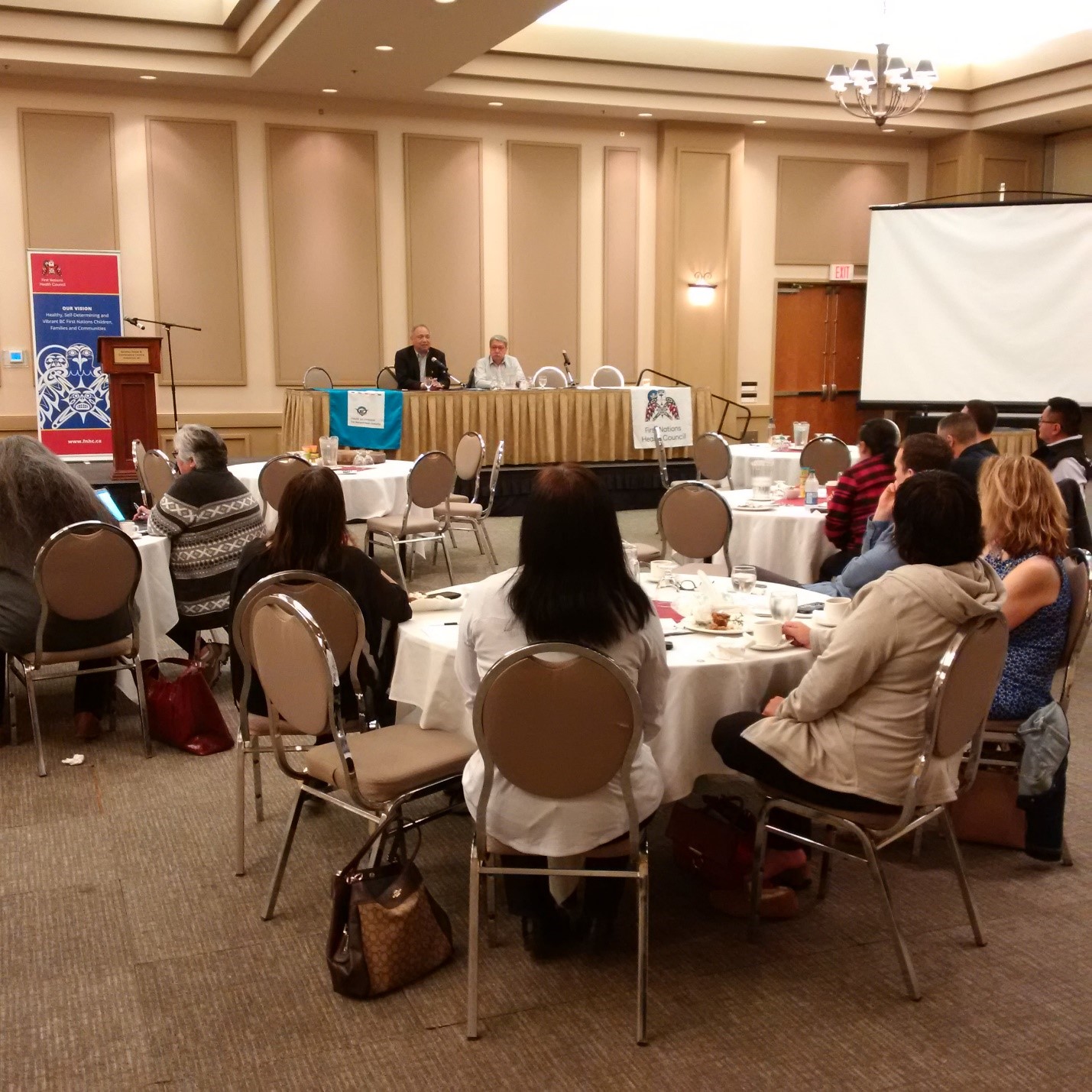
Above: Steven Point and Satsan Herb George discussing Nation-based Governance.
"Ancestral law does not manage the land, it manages the human impact on the land. Natural Law corrects itself," said Steven Point. "We're standing on the threshold of a new era." Point made note that many communities area already doing traditional governance, and that it's a matter of expanding on this, while as Satsan described being led by community members who are the true title and right holders.
Continuing with the theme of letting go, day three and the event ended with a second ceremony of things to keep and things to let go of, led by Fraser Salish FNHC representative Willie Charlie from Sts'ailes.

